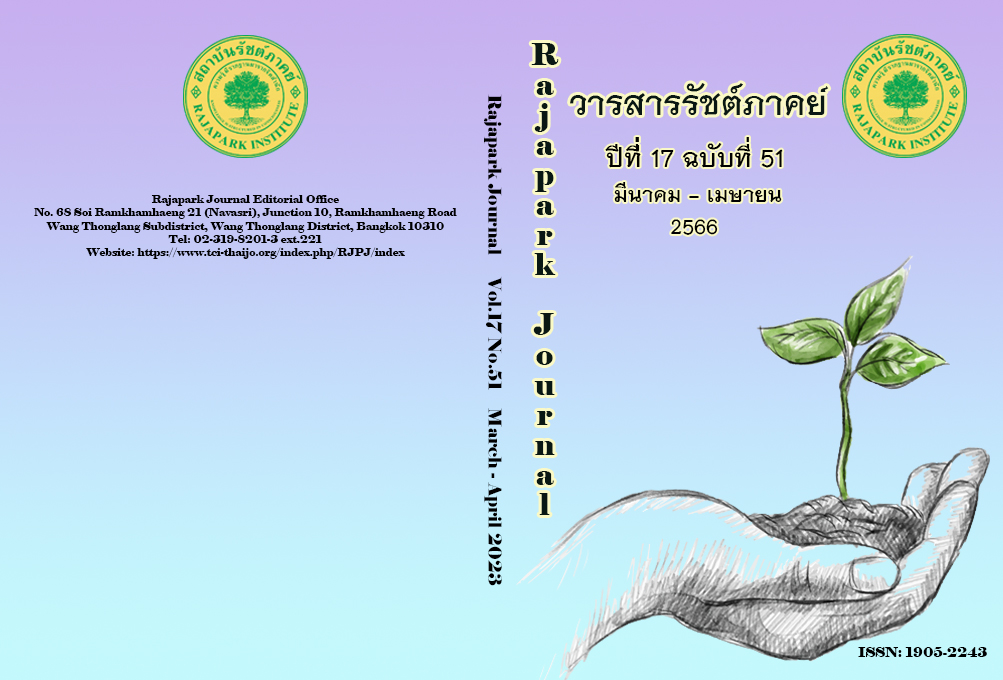การศึกษาทัศนะอาจารย์นิเทศและครูพี่เลี้ยงที่มีต่อความสามารถในการสร้างคำอธิบายเชิงวิทยาศาสตร์ของนักศึกษาฝึกประสบการณ์วิชาชีพครูวิทยาศาสตร์ มหาวิทยาลัยราชภัฏกลุ่มภาคตะวันออกเฉียงเหนือ
Main Article Content
บทคัดย่อ
การวิจัยครั้งนี้มีวัตถุประสงค์เพื่อศึกษาทัศนะของอาจารย์นิเทศก์และครูพี่เลี้ยงที่มีต่อความสามารถในการสร้างคำอธิบายเชิงวิทยาศาสตร์ของนักศึกษาครูวิทยาศาสตร์มหาวิทยาลัยราชภัฏแห่งหนึ่งในกลุ่มภาคตะวันออกเฉียงเหนือ รูปแบบการวิจัยเป็นการวิจัยเชิงคุณภาพ ทำการศึกษาเชิงปรากฏการณ์วิทยาแบบตีความ ตามแนวคิดของ Heidegger ผู้ให้ข้อมูลหลักเป็นอาจารย์นิเทศก์และครูพี่เลี้ยง จำนวน 8 คน ที่มีประสบการณ์การจัดการเรียนรู้วิชาวิทยาศาสตร์และการนิเทศ 7-9 ปี ใช้การเลือกแบบเจาะจง เก็บรวบรวมข้อมูลโดยใช้การสัมภาษณ์เชิงลึก ด้วยแบบสัมภาษณ์กึ่งโครงสร้าง วิเคราะห์ข้อมูลตามกระบวนการของ Leonard ตรวจสอบความน่าเชื่อถือของข้อมูลด้วยวิธีการตรวจสอบแบบสามเส้า ผลการศึกษาพบว่าอาจารย์นิเทศก์และครูพี่เลี้ยงเสนอทัศนะตามประสบการณ์ของตนเองว่านักศึกษาครูวิทยาศาสตร์สามารถสร้างคำอธิบายเชิงวิทยาศาสตร์ได้ครบทั้ง 3 องค์ประกอบได้แก่ ข้อกล่าวอ้าง หลักฐานและการให้เหตุผลในลักษณะข้อความสั้น ๆ ที่ไม่ได้เชื่อมโยงกันอย่างสมบูรณ์ โดยนักศึกษาระบุข้อกล่าวอ้างถูกต้องตามแนวคิดทางวิทยาศาสตร์หากเป็นเนื้อหาที่กำลังเรียนรู้ หรือเพิ่งได้เรียนรู้ผ่านไปไม่นาน นักศึกษาได้หลักฐานจากกระบวนการสืบเสาะหาความรู้ผ่านการทดลองและสืบค้นที่มีความสัมพันธ์กับข้อกล่าวอ้างแต่ยังไม่เพียงพอส่งผลต่อการให้เหตุผลที่ไม่สมบูรณ์ และการจัดการเรียนรู้แบบสืบเสาะ ให้นักศึกษาได้ลงมือปฏิบัติ ฝึกการนำเสนอผลการทดลองและสรุปหลักการทางวิทยาศาสตร์บ่อยครั้งจะช่วยส่งเสริมความสามารถในการสร้างคำอธิบายเชิงวิทยาศาสตร์ของนักศึกษาได้
Article Details

อนุญาตภายใต้เงื่อนไข Creative Commons Attribution-NonCommercial-NoDerivatives 4.0 International License.
ทัศนะและความคิดเห็นที่ปรากฏในวารสาร ถือเป็นความรับผิดชอบของผู้เขียนบทความนั้น และไม่ถือเป็นทัศนะและความรับผิดชอบของกองบรรณาธิการ
เอกสารอ้างอิง
Amelia, R., Rofiki, I., Tortop, H., & Abah, J. (2020). Pre-service Teachers’ Scientific Explanation with e-scaffolding in Blended Learning. Journal Ilmiah Pendidikan Fisika Al-BiRuNi, 9(1), 33-40.
Becker, E. R. (2014). Explicit Instruction of Scientific Explanation and Argument in an Undergraduate Introductory Biology Laboratory Course Using the Claim, Evidence and Reasoning Framework. Louisiana State University and Agricultural and Mechanical College, Louisiana.
Berland, L. K. (2008). Understanding the Composite Practice that Forms When Classrooms Take Up the Practice of Scientific Argumentation. Northwestern University, Evanston.
Chaowakeratipong, N. (2019). Enhancing the Ability in Constructing Scientific Explanations of Learners by Using the Inquiry Teaching Method. STOU Education Journal, 12(1), 40-54.
Chumsaeng, T., Jantarakantee, E., & Chiangga, S. (2017). The Development of Grade 10 students’ Scientific Explanation Ability in Equilibrium Unit Using Context-Based Approach. https://gsbooks.gs.kku.ac.th/60/nigrc2017/pdf/HMO5
Gotwals, A. W., & Songer, N. B. (2012). Assessing Students’ Progressing Abilities To Construct Scientific Explanations. https://www.researchgate.net/publication/290096018.
Gilmanshina, S. I., Gilmanshin, I. R., & Sagitova, R. N. (2016). The Feature of Scientific Explanation in the Teaching of Chemistry in the Environment of New Information of School Students’ Developmental Education. International Journal of Environmental & Science Education, 11(4), 349-358.
Hadkhuntod, P. (2018). The Effects of Inquiry Learning Management (5Es) Emphasizing Provision of Scientific Explanation on Science Learning Achievement in the Topic of Weather and Scientific Explanation Creation of Matthayom Suksa I Students at Nawamintrachinuthit Suan Kularb Wittayalai Pathum Thani School in Pathum Thani Province. Journal of Kasetsart Educational Review, 35(1), 35-47.
Heidegger, M. (1962). Being and time. In J. Macquarrie, & E. Robinson, (Translator). Harper & Row.
Independent Committee for Education Reform (ICER). (2019). Education Reform Country Plan. Office of the Education Council: ONEC.
Kamtet, W. (2020). Scientific Explanation Ability Assessment Based on Context-Rich Problems for Biology Student Teachers. Journal of Education, Prince of Songkla University, Pattani Campus, 31(3), 45-59.
Kedcham, A., & Sitthisopasakul, T. (2022). Test of Gender Invariance of the Test Anxiety Scale among Secondary School Student. Journal of Institute of Trainer Monk Development, 5(4), 11-23.
Leonard, V. W., (1989). A Heideggerian Phenomeno- logic perspective on the concept of the Person. Advances in Nursing Science, 9, 40-55.
Lertdechapat, K., & Promratana, L, P. (2018). Effects of Collaborative Inquiry on Ability in the Scientific Explanation Making of Lower Secondary School Students. Journal of Education Studies, 46(2), 1-20.
McNeill, K. L., & Krajcik, J. (2006). Supporting Students’ Construction of Scientific Explanation Through Generic Versus Context-Specific Written Scaffolds. https://www.researchgate.net/publication/228850868_Supporting_students%27
McNeill, K. L., & Krajcik, J. (2008). Scientific Explanations: Characterizing and Evaluating the Effects of Teachers’ Instructional Practices on Student Learning. Journal of Research in Science Teaching, 45(1), 53-78.
Meela, P., & Artdej, R. (2017). Model-based Inquiry and Scientific Explanation: Promoting Meaning-making in Classroom. Journal of Education Naresuan University, 19(3), 1-15.
Molefe, P., & Khwanda, M. N. (2019). An Evaluation of the Impact of Scientific Explanation Model on Pre-service Teachers’ Understanding of Basic Concepts in Electricity. The South African Institute of Physics, 64, 221-226.
Nuansrijun, T. (2017). Interpretative Phenomenological Analysis: A Qualitative Methodology for Psychological Research. Journal of Education, 28(3), 1-13.
Organization for Economic Co-operation and Development (OECD). (2013). Education at a Glance 2013. OECD Indicators.
Saxton, E., & Hoffenberg, R. (2015). Scientific Explanations: A Comparative Case Study of Teacher Practice and Student Performance. Electronic Journal of Science Education, 19(5), 1-39.
The Institute for the Promotion of Teaching Science and Technology (IPST). (2020). Scientific Literacy. https://pisathailand.ipst.ac.th/about-pisa/scientific-literacy/.
Yao, J. X., Guo, Y. Y., & Neumann, K. (2016). Towards a Hypothetical Learning Progression of Scientific Explanation. Asia-Pacific Science Education, 2(4), 1-17.


